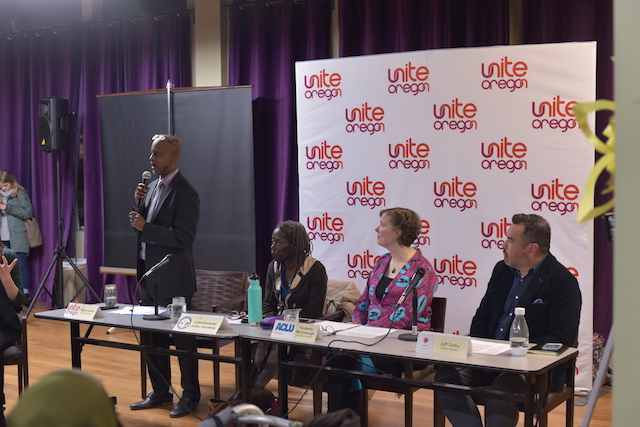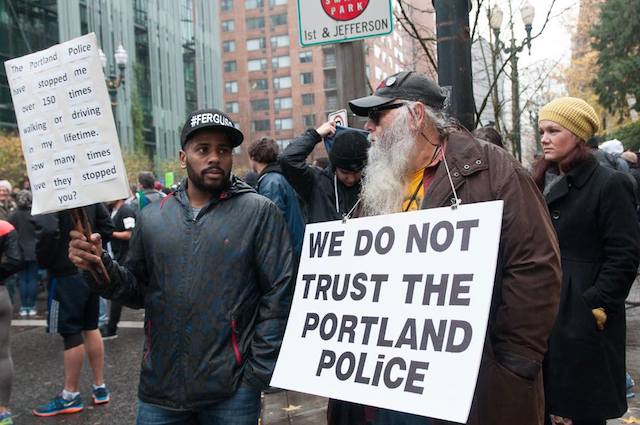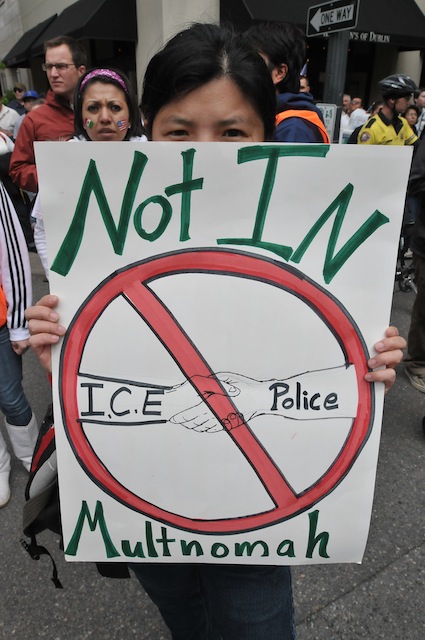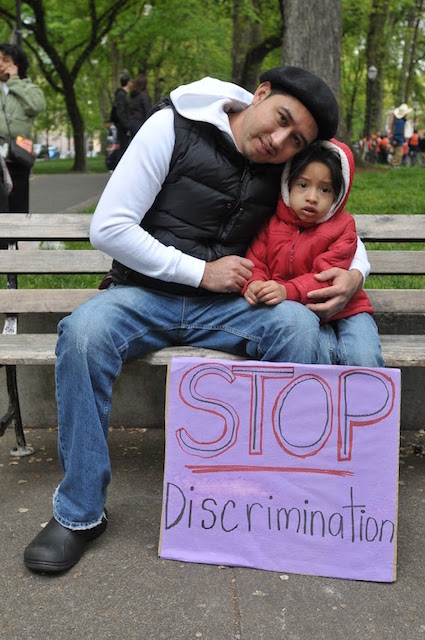
Story by Pete Shaw
Portland has a multiple personality disorder when it comes to its relationship with the FBI’s Joint Terrorism Task Force (JTTF). It refuses to join, then it joins, then it leaves, then it partially rejoins, and then it again fully joins. And now it is once more considering leaving the task force.
The charge to abandon Portland’s relationship with the JTTF is being led my newly elected City Commissioner Jo Ann Hardesty. On Wednesday January 16th, Hardesty, along with Unite Oregon’s Executive Director, Kayse Jama; the Oregon American Civil Liberty Union’s (ACLU) Legislative Director, Kimberly McCullough; and the former president of the Portland Japanese American Citizens League (JACL), Jeff Selby, held a forum regarding the City’s possible departure from the task force. The meeting, which was attended by over 100 people, was held at Unite Oregon’s office on North Killingsworth Street.
The main contentions regarding Portland’s participation in the JTTF surround both public safety and transparency on the part of the FBI. One might be inclined toward believing these should work in tandem, but that has not been the history of Portland’s relationship with the JTTF. For that matter, the history of the FBI is replete with a lack of transparency, best exemplified by COINTELPRO, the FBI surveillance program that ran unchecked for 15 years. From 1956-1971, the FBI infiltrated, spied on, discredited, and disrupted numerous political organizations in the US that were formed to gain greater justice for various groups of people, such as the Black Panthers who were working to help their communities as they fought against the results of the white supremacist ideology and institutions that have guided the country since its inception. During the time, the FBI also spied on anti-Vietnam War protesters, feminist groups, religious communities, and any other organization it deemed subversive. That list also included the Ku Klux Klan, but by and large its efforts have focused on those groups and individuals working against the system that spawned the likes of the Klan.
Furthermore, while COINTELPRO is an official label for a particular program, its basic tactics of disruption have been used by the FBI since its inception. There is no reason to doubt that the FBI continues to use those ploys, and it makes little sense to believe that Portlanders, particularly those who are not white, are made safer with Portland as a member of the Joint Terrorism Task Force.
“On the campaign trail,” said Hardesty last Wednesday, “what I heard over and over again from people was their sense of insecurity, just walking around Portland. There is a difference between feeling safe versus being over-policed.”
The Joint Terrorism Task Force was created in 1980 as an alliance between various federal, state, and local law enforcement agencies for the purpose of fighting terrorism. Portland resisted joining the JTTF until 1997, a relationship that the City Council formalized three years later despite the concerns of activist groups including the ACLU of Oregon, the Portland NAACP, and Portland Copwatch. The relationship was further strengthened after the terrorist attacks on September 11, 2001, which Hardesty noted was partially the product of the FBI “doing an excellent job selling fear” after the hijackings and bombings.
In 2005, under Mayor Tom Potter, Portland left the JTTF over concerns about its abuse of power. Speaking about the break, Potter said, “When we look at our history, we see examples that when we blindly give people power, that sometimes the power is misused. I don’t think whether we stay in or out of the JTTF will determine the safety of Portland citizens. I think what will determine the safety of Portland citizens is when we work together, when we watch out for each other and care for each other, that our society is safer.”

However, Portland was coaxed back into the relationship after 2010’s faux-attempted bombing of the Christmas tree lighting ceremony in Pioneer Square by Mohamed Osman Mohamud, a refugee from Somalia of about 20 years who was recruited, coached, and then after following his tutelage, arrested. Despite questions of entrapment, the event prompted a unanimous vote from the City Council to join the JTTF on a case-by-case basis. In 2015, the City fully rejoined the JTTF with two Portland police working in collaboration with the task force.
It is difficult by any measure to conclude that the JTTF has made the people of Portland safer. If anything, Mohamud’s case shows an FBI willing to set up a young Black man from beginning to end to show its commitment to stopping terrorism. One might add that the event equally showed the FBI’s willingness to create terrorists as it is difficult to believe when reading about Mohamud’s recruitment that he, with only his own volition and resources, would have tried to commit such an act. McCullough said she found it “interesting” that the FBI would chose to manufacture a terrorist in Portland during the period it had withdrawn from the JTTF.
More importantly, the people of Portland do not know if the JTTF is keeping them safer because they are not allowed to know. For that matter, not even the mayor or the police chief is allowed to know. In particular, the mayor and police chief–and the citizens of Portland–are not allowed to know how the two Portland police officers collaborating with the JTTF are being used. Who are they surveilling? What data are they gathering and sharing? Portland’s citizens are kept in the dark.
That is important, not just for the general reason that in a society with democratic institutions, the people should know what their government is doing, particularly toward them. Oregon has stringent laws regarding surveillance. These laws forbid police from profiling and targeting people based on, among many other criteria, their race, ethnicity, religion, and political affiliations. So, for example, it is against the law for local police to surveil an entire mosque. And it is certainly illegal for them to spy on Portland’s entire Muslim community.

McCullough noted that the FBI tends to “target groups it sees as more dangerous than others.” This, she said, destroys community trust, chills political activity, and makes people not likely to engage in their religious practices and with their communities.
Jama added that if the FBI is spying on the Muslim community–for example, if spies are in a room where members from different mosques are meeting–they help create “hysteria and fear among our communities,” where people become fearful of their neighbors and other communities.
For Jama, this is the crux of the issue. The question of Portland’s involvement in the JTTF is a question of what we want Portland to be. Stating that he wanted a Portland dedicated to “equality for all–not some, but for all,” Jama emphasized the importance of building “a community where there is no fear.”
“We want to create and envision a community,” Jama said, “where every person’s rights are protected. I believe the Joint Terrorism Task Force is not offering that kind of space.”
Federal laws regarding surveillance are not so strict as Oregon’s, and neither the FBI’s nor the Portland Police Bureau’s history lends itself toward citizens giving them the benefit of the doubt. For example, an FBI report leaked in October 2017 warned of the terror threat posed by what it termed “Black Identity Extremists” (BIE), which was also defined as a movement. (https://assets.documentcloud.org/documents/4067711/BIE-Redacted.pdf) But the membership of the BIE is not well-defined. Reading the document, it is easy to come away with the conclusion that the only three requirements to become a Black Identity Extremist are to be Black, to stand up against police murdering Black people with impunity, and scaring white people– particularly those in the FBI–when they demand justice. That sounds like a reasonable description of the Black Lives Matter Movement, as well as Portland’s own Don’t Shoot Portland.
It is a vague definition, one that could easily be used to describe any Black person engaged in anything the FBI defines as threatening. Its opacity is nothing new for the FBI. Nor is the sense of paranoia that seeps from it. In the document, the FBI predicts “it is very likely that BIE’s perceptions of unjust treatment of African Americans and the perceived unchallenged illegitimate actions of law enforcement will inspire premeditated attacks against law enforcement over the next year.”
Between its history and this leaked document, it should come as no surprise that when the FBI was given the chance to show that the JTTF, in coordination with the Portland police, was operating above board, it did not. McCullough told the crowd that when the City rejoined the JTTF, though on a case-by-case basis, the FBI agreed to give a public annual report about its cooperation with Portland’s police. McCullough described those reports as “grossly inadequate,” “terrible,” and “pointless.”
The upshot is that the people of Portland have never been given the truth about what the JTTF is doing on a day to day basis. And as Hardesty and McCullough noted, it is possible that the JTTF is violating Portlanders’ state rights. We simply do not know because the JTTF will not let us know.
The FBI, now worried that the City Council may withdraw Portland from the JTTF due to Hardesty’s position on the council and her opposition to the program–and that Commissioner Amanda Fritz is opposed to the collaboration, and Commissioner Chloe Eudaly has not fully weighed in (Mayor Wheeler and Commissioner Nick Fish have stated they would like the partnership to continue)–is trying to make nice with her. Earlier in the week, Renn Cannon, who is in charge of the FBI’s Portland division, and another nine agents, had explained to Hardesty why Portland should remain in the JTTF.

Hardesty was not won over. Her longtime work fighting against racism and for police reform has likely led to deep skepticism regarding anything the FBI says, but even the most rudimentary schooling in the history of the organization shows that one should cast a jaundiced eye on its statements. When Cannon told Hardesty there were clear lines drawn between what the FBI is doing in Portland and what the police do with the JTTF, she was skeptical. When Hardesty asked about the grossly inadequate, terrible, and pointless reports, she was told the JTTF “didn’t know” they had to give reports. But now, with the legitimate threat of Portland leaving the JTTF, Hardesty said the FBI was now willing to share. Considering the FBI’s past performance, she was not buying it.
“We just don’t know how much data the FBI is collecting, what they are doing with the data, and how they are using that data to have an impact on community members,” Hardesty told Wednesday night’s crowd.
Another problem members of the panel had with the JTTF was how collaborating with it implicitly meant collaborating with the Immigration and Customs Enforcement Agency (ICE) which is part of the task force. ICE is running amok across the country, sweeping up immigrants and tearing apart families and communities. It is hard to see how working with an agency that, as Hardesty noted, has been snatching people from the Multnomah County Courthouse, dovetails with Portland’s declaration of being a Sanctuary City, as well Oregon’s proclamation of sanctuary statehood.
“We cannot pretend we are a Sanctuary City,” said Hardesty, “when ICE is doing this.”
Jama added, referring to the refugee crisis at the Mexico-US border, “How are we going to allow our police to collaborate with ICE that puts children in cages?”
Seeking to appease Hardesty, the FBI told her that most of its work right now was focused on white supremacists. This prompted Hardesty to wonder to the crowd about how many of them were familiar with this. Presumably knowing some of FBI’s history, many people responded with a mirthless chuckle. Later, during the question and answer period, Hardesty mentioned that earlier in the day, she had found out that the Portland police had an officer who investigates hate crimes, a fact that seemed to come as much of a surprise to the audience as it did to her.

“Everybody’s investigating hate crimes,” Hardesty noted as a sardonic aside.
During the question and answer portion of the event, the panel was asked how the Portland police could address white supremacists without the FBI. Hardesty replied that the FBI, not the JTTF, is responsible for that, saying it would have “no impact on investigating white supremacists.”
Another person asked if the panel would endorse Portland staying in the JTTF if the FBI agreed to transparency regarding what the task force is doing in collaboration with the Portland police. McCullough replied that the City tried this once before when it rejoined the JTTF on a case-by-case basis in 2011 with the understanding that there would be greater transparency. “Those protections didn’t work,” she responded. “We just don’t trust that these types of protections actually work.”
When asked how the City would respond in an emergency such as a terrorist attack, Hardesty, who oversees the Bureau of Emergency Management, said it would “implement emergency measures using our first responders,” making sure Portlanders would “have full access to all public safety resources.”
Another audience member asked if the JTTF has been giving data to private businesses, security firms, and political parties. Hardesty gave a simple answer: “We don’t know.” McCullough echoed those words.
What we do know is history. As Selby put it, “We look back in order to move forward.”
Selby talked about how on December 7, 1941, within five hours of the Japanese attack on Pearl Harbor, over 100 people of Japanese descent living in Portland were rounded up. They had committed no crime, but were nonetheless placed in the Multnomah County and Rocky Butte jails. Selby said that in prior years the FBI had profiled the community, which is what allowed them to arrest those people so quickly. Communities were not made safer. They were made fearful.
“To ignore our history,” said Selby, “is to marginalize the experiences of our fellow Portlanders.”
Want to get involved? Contact your City Commissioners to let them know you oppose the City of Portland being part of the Joint Terrorism Task Force. Their emails can be found by following the link to their City webpages, available at: https://www.portlandoregon.gov/article/224450






